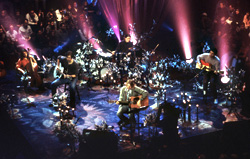In the backstage bowels of Neumo’s after last Saturday’s Walkmen show, discussion among the members of openers Visqueen veered from inclusion of Van Halen covers in future sets to the growing uselessness of the term “green” to the panicked mind-set of major labels in the wake of Radiohead‘s pre-emptive sales strike. The increasing popularity of “360 deals”—essentially desperate purse-string grabs by record labels to take a percentage of concert and merchandise revenues—prompted negative responses from the musicians on hand, particularly Visqueen bassist and producer Barrett Jones, who knows a thing or two about the minefields of major labels via his work on records by the Foo Fighters, Bush, and, of course, Nirvana. Whether it’s the ambitious artist, the producer trying to run interference between label, artist, and management, or a well-intentioned visionary like Rick Rubin trying to rebuild the concept of genuine artist development, it’s evident that changes within the music biz are impacting everyone.
In light of these seismic shifts, it’s hard not to wonder what Kurt Cobain would make of it all. This week’s DVD release of MTV’s Nirvana: Unplugged in New York brings up the complex impact of that broadcast and the subsequent sales it produced. Filmed 14 years ago this week, the dressed-down set first aired on Dec. 14, 1993, less than four months prior to Cobain’s death. When DGC/Universal released it on CD in November of ’94 (just in time for the holiday shopping rush), it debuted at No. 1, won the Grammy for Best Alternative Music Album, and went platinum five times over.
There’s no doubt that the performance captured is impressive and an important documentation of the band’s end days. On a stage lit with black taper candles and dourly dressed with stargazer lilies (Cobain’s request), Nirvana played 14 dramatically rendered songs (six of which were covers), deliberately shying away from any major “hits” save for “Come as You Are.” The chilling, beautiful moments are many, even without morbid hindsight. Prior to covering David Bowie‘s “The Man Who Sold the World,” Cobain offers an apologetic dismissal, warning the audience: “I guarantee you I will screw this song up.” What follows is a version of that song so utterly perfect and hypnotic that Bowie temporarily lost cultural custody of his own work.
But tension between Cobain, the audience, and MTV’s producers is evident throughout, a reality he periodically tries to defuse with humor, with varying results. He sarcastically chides stagehands for delays tuning an extra guitar for one of the Kirkwood brothers when they join the band for a handful of Meat Puppets covers (“What are they tuning, a harp?”), and prior to the last number—when an audience member shouts out a request for “Rape Me”—Cobain immediately retorts, “I don’t think MTV would let us play that.” Finally, in a tone both gracefully decisive and playfully puckish, he says, “Fuck you all, this is the last song of the evening,” and launches into a gorgeous and gut-wrenching version of Leadbelly’s “Where Did You Sleep Last Night?” Just before delivering the final line of that song, he inhales sharply while his ice-blue eyes fly wide open, seeming to stare at something no one else can see. It’s nearly impossible not to read that unsettling gaze as a heartbreaking premonition, and it’s one of the most haunting moments captured on live television.
On the DVD extra, “MTV News: Bare Witness,” producer Alex Coletti acknowledges that the song selections caused all sorts of behind-the-scenes hand-wringing. “People here started getting tense about whether they would do more hits,” he recalls. Lack of glamorous special guests was also a bone of contention. “First they aren’t doing hits, and now they’re bringing the Meat Puppets up,” sighs Coletti, inadvertently illuminating the very reasons why the mainstream music machine that Cobain was working within was starting to wear him down. Perhaps this is ultimately what makes watching Unplugged in New York so difficult to enjoy. Despite the unvarnished elegance of the performances and the simple value of their documentation, it’s hard to shake the feeling that, intentionally or not, Cobain was providing MTV and Universal/DGC with a highly marketable benediction—and one that they’ll continue to profit handsomely from for decades to come.
Nirvana’s Krist Novoselic is blogging at www.seattleweekly.com/kristnovoselic.








